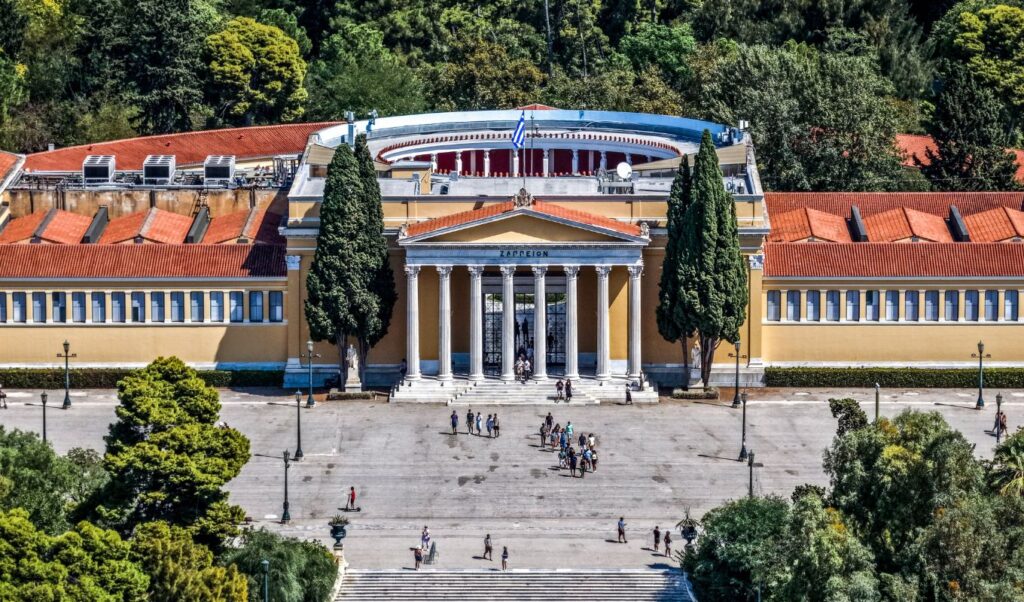Our country is transforming into a center of energy diplomacy for two days, with officials from America and Europe converging on Athens to participate in the sixth Partnership for Transatlantic Energy Cooperation (P-TEC). The focus of this energy forum is shaping a new energy map with Greece as the central axis, emerging as a hub for transporting American LNG to Balkan and Central European countries. Top American officials have played a significant role in this, led by Interior Secretary and head of the US Energy Sovereignty Council Doug Bergum, who has been characterized as the “energy czar,” and Chris Wright, Secretary of Energy.
Greece becomes central gateway for American LNG to Europe
One of the important objectives of the P-TEC Summit is to contribute to LNG infrastructure development and strengthen the Vertical Corridor that will operate bidirectionally and connect Balkan countries reaching Ukraine and Central Europe, thus establishing Greece as the central gateway for American LNG distribution.
How Greece became an energy hub
Multiple factors contributed to our country’s transformation into an energy hub. The ongoing war in Ukraine that brought the decision to exclude Russian natural gas, the presence of Chevron and ExxonMobil in Greek maritime blocks in the Peloponnese and south of Crete, as well as Turkey’s inability to disconnect from Russian energy supply, led to leveraging the country’s geostrategic position and energy upgrading of Revithoussa and Alexandroupolis infrastructures.
As Environment and Energy Minister Stavros Papastavrou had stated, “our country has a privileged geographical position between three continents – Asia, Europe, Africa. It has the necessary infrastructure that Greek taxpayers have paid for in Revithoussa and Alexandroupolis, while it has political and economic stability and an investment-friendly government, with energy realism that allows us to speak the same language as the US.”
25 countries declared participation in the P-TEC Summit. Discussions will focus on energy security, Europe’s independence from Russian natural gas, new technologies, and connecting energy with artificial intelligence. The conference co-organizers, US Energy Secretary Chris Wright and Greek Environment and Energy Minister Stavros Papastavrou, will open the proceedings.
P-TEC conference participants
Besides American Interior Secretary Doug Bergum and US Energy Secretary Chris Wright, other participants include Undersecretary of State for Management and Resources Mike Rigas, Undersecretary of State for Economic Development, Energy and Environment Jacob Helberg, Deputy Assistant Secretary for International Nuclear Policy and Cooperation, US Department of Energy (DOE) Aleshia Duncan, Deputy Assistant Secretary for the Office of International Affairs, US Department of Energy (DOE) Tommy Joyce, and Deputy Assistant Secretary for Europe, Eurasia, Africa and the Middle East, US Department of Energy (DOE) Josh Volz.
Ministers from Albania, Bosnia-Herzegovina, Bulgaria, Croatia, Cyprus, Czech Republic, Estonia, Hungary, Kosovo, Latvia, Lithuania, Moldova, North Macedonia, Romania, and Slovakia will also attend. Specifically, Belinda Balluku, Deputy Prime Minister and Minister of Infrastructure & Energy of Albania, Ljiljana Lovrić, Deputy Minister of Foreign Trade and Economic Relations of Bosnia and Herzegovina, Zhecho Stankov, Energy Minister of Bulgaria, Ante Šušnjar, Economy Minister of Croatia, George Papanastasiou, Minister of Energy, Trade and Industry of Cyprus, Ivo Šilhavý, Ambassador of the Czech Republic to Greece, Andres Sutt, Minister of Energy and Environment of Estonia, Péter Sztáray, Deputy Minister of Foreign Policy and Energy Security of Hungary, Artane Rizvanolli, Economy Minister of Kosovo, Kaspars Melnis, Minister of Climate and Energy of Latvia, Žygimantas Vaičiūnas, Energy Minister of Lithuania, Dorin Ciunguietu, Energy Minister of Moldova, Sanja Božinovska, Minister of Energy, Mining and Mineral Resources of North Macedonia, Cătălin Predoiu, Interior Minister and Deputy Prime Minister of Romania, Alexandru Nazare, Finance Minister of Romania, Denisa Saková, Economy Minister and Deputy Prime Minister of Slovakia, Jovana Joksimović, Deputy Minister for International Cooperation and EU Integration of Serbia, Tamara Weingerl Požar, Ambassador of Slovenia to Greece, and Svitlana Hrynchuk, Energy Minister of Ukraine.
More than 300 energy companies will attend, with top representatives from companies like ExxonMobil, Baker Hughes, Venture Global LNG, Westinghouse, Cheniere, Woodside Energy, Google, Amazon, Italgas, and Excelerate Energy.
AKTOR-DEPA Trading cooperation
Infrastructure projects and investment opportunities in the energy sector will be at the center of discussions. It’s no coincidence that shortly before the P-TEC Conference in Greece, the AKTOR group and DEPA Trading announced the establishment of ATLANTIC – SEE LNG TRADE SA, which aims to purchase and import liquefied natural gas to Greece (LNG) and further sell it outside Greece.
Special importance is also given to electrical interconnections, such as the Crete-Cyprus-Israel electrical cable connection, while on the conference sidelines there will be a “3+1” format meeting of representatives from Greece, Cyprus, and Israel with US participation aimed at energy integration of the Eastern Mediterranean.
Today’s first day includes panels with government ministers like Kyriakos Pierrakakis, Vassilis Kikilias, and Dimitris Papastergiou participating, while tomorrow’s second day includes a speech by Prime Minister Kyriakos Mitsotakis. Discussions will cover topics such as the role of natural gas in Europe’s new energy geography, the Vertical Natural Gas Corridor, infrastructure investments, artificial intelligence in energy and energy system resilience, strengthening energy security and supply adequacy, sustainable infrastructure development, and the role of LNG as a tool for competitiveness and regional stability.




